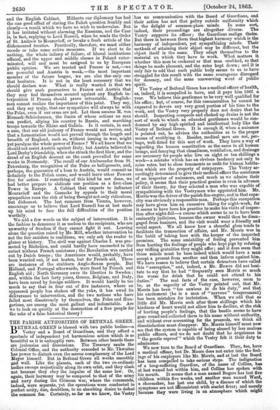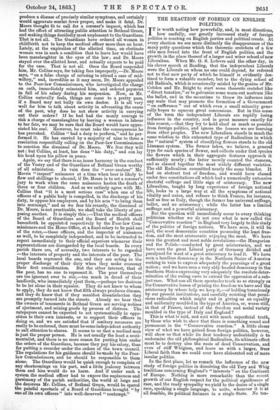THE PARISH AUTHORITIES OF BETHNAL GREEN. has no communication with
the Board of Guardians, and their action has not that paltry outside uniformity which is the delight of common-place minds. In some sort, indeed, their proceedings are altogether diverse. The Vestry supports its officer ; the Guardians malign theirs. But there is between them that highest harmony which is the harmony of independent, yet sympathizing minds. Their methods of attaining their object may be different, but the object itself is the same. They adapt themselves to the material on which they have to work. What matters it whether this man be cockered or that man snubbed, so that things be made pleasant, and the rates kept down ; and it is only fair to add that each public body seems to us to have struggled for this result with the same courageous disregard for decency, and the same unswerving want of public spirit. The Vestry of Bethnal Green has a medical officer of health, as, indeed, it is compelled to have, and it pays him 1001. a year. We believe this gentleman to be very well qualified for- his office ; but, of course, for this remuneration he cannot be- expected to devote any very great portion of his time to the work, and the Vestry very properly does not desire that he- should. Inspecting cesspools and choked-up drains is not the sort of work to which an educated gentleman would be con- demned by any high-spirited and intellectual body like the Vestry of Bethnal Green. It is enough if, when a nuisance is pointed out, he advises the authorities as to the proper means of rectifying it. Besides, medical men are not, per- haps, well-fitted for this sort of work. They have a way of regarding, the human constitution as the same in all human haps, well-fitted for this sort of work. They have a way of regarding, the human constitution as the same in all human beings, and fancying that cleanliness, ventilation, and drainage are necessary for people who live on eight or ten shillings a week—a mistake which has an obvious tendency not only to raise rates, but to close tenements as unfit for human habita- tion which are the property of ratepayers. The Vestry ac- cordingly determined to give their medical officer the assistance of an inspector .of nuisances, and much as we admire their policy, it seems that their practical genius is even in advance of their theory, for they selected a man who was capable of sympathizing with the Vestrymen who appointed him. Mr.. Morris was the driver of the parish fire-engine, and in that capa- city was obviously a responsible man. Perhaps this occupation may have given him an excessive liking for night-work, for it seems to have been his practice to make his visits of inspec- tion after night-fall—a course which seems to us to have been eminently judicious, because the owner would then be disen- gaged from business, and the visit would wear a friendly and social aspect. We all know how a cheerful glass tends to facilitate the transaction of affairs, and Mr. Morris was in the habit of taking beer with the keeper of the inspected premises. The same amiability of feeling prevented him from hurting the feelings of people who kept pigs by refusing any trifling gratuities they might offer; and it does seem that those minds must be base indeed which would have a man, accept a present from another and then inform against him. We have reason to believe that certain detractors have called this "corruption," and, indeed, a Mr. Hewes did not hesi- tate to say that he had " frequently seen Morris so much the worse for drink that he could not attend to his duties." The real facts of the case, however, seem to be, as the sagacity of the Vestry pointed out, that Mr., Morris has been " too anxious to do his duty," and that his excitement (he is a man of " nervous " temperament) has been mistaken for inebriation. When we add that so little did Mr. Morris seek after those shillings which his kindness of heart would not allow him to decline, at the risk of hurting people's feelings, that the beadle seems to have gone round and collected them in his name without authority, and without ever accounting for the proceeds, we think all dissatisfaction must disappear. Mr. Morris himself must now see that the system is capable of being abused by less zealous- public officers, and we do not doubt that he acquiesces in " the gentle reproof " which the Vestry felt it their duty to administer.
We now turn to the Board of Guardians. They, too, have a medical officer, but Dr. Moore does not enter into the feel- ings of his employers like Mr. Morris, and at last the Board has been compelled to take serious steps. The indignation of a long-suffering Guardian, of the name of Collins, has at last waxed hot within him, and Collins has spoken with his mouth. It seems that a man named Rogers has lost five children within five weeks, and another man named Ward, a shoemaker, has lost one child, by a disease of which the symptoms are not fitonsistent with scarlet fever; and merely because they were living in an atmosphere which might produce a disease of precisely similar symptoms, and certainly would aggravate scarlet fever proper, and make it fatal, Dr. Moore thought fit to call for a coroner's inquest, which has had the effect of attracting public attention to Bethnal Green, and making things decidedly most unpleasant to the Guardians. That is not all. The Guardians have ordered all women in childbirth not to keep the medical officer more than an hour. Lately, at the expiration of the allotted time, an obstinate woman was in such a condition that to leave her would have been manslaughter in the eyes of the law; and Dr. Moore stayed over the allotted hour, and actually expects to be paid for the case. That is not all. Once the Board suspended him, Mr. Collins says, for taking fees improperly,—Dr. Moore says, " on a false charge of refusing to attend a case of mid- wifery," and, incredible as it may seem, Dr. Moore appealed to the Poor-law Commissioners, who investigated the charge on oath, immediately reinstated him, and ordered payment in full of his salary during his suspension. Now, as Mr. Collins naturally feels, things are come to a pretty pass, if a Board may not bully its own doctor. It is all very well for him to talk about activity in advocating the cause of the poor, why does he not show activity in carrying out their orders? If he had had the manly courage to risk a charge of manslaughter by leaving a woman in labour to her fate, we may be sure that the Board would have appre- ciated his zeal. However, he must take the consequences he has provoked. Collins " had a duty to perform," and he per- formed it. He has carried by a majority of nine to three a resolution respectfully calling on the Poor-law Commissioners to sanction the dismissal of Dr. Moore. We fear they will not ; but Collins, at least, has done " his duty," and can lay his head upon his pillow in peace. Again, we say that there is an inner harmony in the conduct of the Vestry and of the Guardians of Bethnal Green worthy of all admiration. In vain does the " over-zealous" Mr. Morris "inspect" nuisances at a time when beer is likely to flow and shillings to abound, if Dr. Moore is to set a coroner's jury to work when the same nuisances hasten the death of three or four children. And as we entirely agree with Mr. Collins that "it is a most serious case" when one of the officers of a public 'body is compelled, in the discharge of his duty, to oppose his employers, and by his acts " to bring them into contempt," and as we fear his remedy, the dismissal of Dr. Moore, is not practicable, we shall take the liberty of pro- posing another. It is simply this :—That the medical officers of the Board of Guardians and the Board of Health shall henceforth be appointed respectively by the Poor-law Com- missioners and the Home Office, at a fixed salary to be paid out of the rates,—these officers, and the inspector of nuisances as well, to be completely independent, and to be instructed to report immediately to their official superiors whenever their representations are disregarded by the local boards. In every parish there are, of necessity, two interests to be regarded —the interests of property and the interests of the poor. The local boards represent the one, and they are acting in the proper discharge of their duty when they make economy their first consideration. But the other interest, that of the poor, has no one to represent it. The poor themselves are too ignorant ever to stir, too much in dread of their landlords, who immediately eject them,—perhaps too desirous to be let alone in their squalor. They do not know to whom to apply, they do not know that filth always produces disease, and they do know that if they manifest dissatisfaction they are promptly turned into the streets. Already we hear that the owners of tenements in Bethnal Green are serving notices of ejectment, and seizing goods by process of distress. The ratepayers cannot be expected to act systematically in oppo- sition to their own interests, or to support their officers in doing so, and we are satisfied that if sanitary measures are really to be enforced, there must be some independent authority to call attention to abuses. It seems to us that a medical man is just the proper person. He is not usually the least a senti- mentalist, and there is no more reason for putting him under the orders of the Guardians, because they pay his salary, than for putting a recorder under the orders of the town .council. The regulations for his guidance should be'made by the Poor- law Commissioners, and he should be responsible to them alone. The Guardians would be quick enough to complain of any shortcomings on his part, and a little jealousy between them and him would do no harm. And if under such a system the medical officer had to expose the supineness and parsimony of the parish authorities, the world at large and the decorous Mr. Collins, of Bethnal Green, would be spared the painful spectacle of a Board of Guirdians brought "by ene of its own officers " into well-deserved " contempt."































 Previous page
Previous page